Segun Ojumu
Maiduguri, Nigeria – Germany has renewed its commitment to the recovery of North-East Nigeria, announcing a €20 million (approximately £17 million) second phase for a joint resilience and peacebuilding programme. The initiative, funded by the German Federal Ministry for Economic Cooperation and Development (BMZ) through KfW Development Bank, is implemented by UNICEF and the World Food Programme (WFP) in partnership with the governments of Borno and Yobe states.
The announcement was made on July 8, 2025, following a successful first phase that supported over 150,000 vulnerable individuals, including under-five children, pregnant and breastfeeding women, out-of-school children, and food-insecure households. The second phase aims to expand these achievements, reaching more than 200,000 people and extending into four additional local government areas: Bama and Konduga in Borno State, and Potiskum and Jakusko in Yobe State.
Addressing Conflict and Climate Impacts
Years of armed conflict in North-East Nigeria, combined with escalating climate change effects, have severely impacted livelihoods, social cohesion, and the well-being of children and women. Insecurity has displaced families, destroyed agricultural livelihoods – the region’s economic mainstay – and contributed to growing food insecurity and acute malnutrition. The protracted conflict has also deepened mistrust, complicating resettlement and peacebuilding efforts.
The project will deliver a range of essential services and resilience-building interventions. These include child protection, food security, safe water supply, nutrition, improved access to education and vocational skills for out-of-school children, promotion of locally produced nutritious foods, strengthened food systems, conditional cash transfers, livelihood opportunities, environmental regreening, and the establishment of peace clubs in schools.
David Stevenson, WFP Country Director in Nigeria, stated, “Food insecurity in Northeast Nigeria remains one of the most critical challenges, exacerbated by climate and economic hardship. Thanks to the support of the German government, climate-adaptive food systems have been revitalised, improving nutrition and economic outcomes for the most vulnerable. Phase II will ensure these gains are extended to additional communities.”
Cristian Munduate, UNICEF Nigeria Representative, added, “Nigeria’s Northeast region remains one of the toughest places to be a child or a woman. This is why UNICEF is excited that the impact of phase one of the joint project is improving the wellbeing and resilience at the household level, one child and woman at a time. UNICEF appreciates the German government for the continued investment.”
Dr. Karin Jansen, Head of Development Cooperation at the German Embassy Abuja, affirmed, “The German government is proud to support long-term, community-led recovery in Northeast Nigeria. By working with trusted partners like WFP and UNICEF, we are helping build resilience against conflict and climate-related challenges, especially for children and women.”
Tangible Results from First Phase
The initial phase of the project has already delivered tangible results. Over 60 solar-powered boreholes and 18 hand pump boreholes have been constructed or rehabilitated, providing safe water to nearly 300,000 people. Nearly 40,000 out-of-school children have gained access to education through formal and informal learning centres. Additionally, to support year-round food production for over 6,000 smallholder farmers, the project supplied drought-resistant seeds and solar-powered irrigation pumps, leading to increased crop yields, improved household consumption of nutritious food, and higher household incomes.
The partners believe that sustained collaboration and investment can shift the trajectory from crisis to recovery, and from survival to self-reliance, securing a resilient and dignified future for communities in North-East Nigeria.




Add Comment